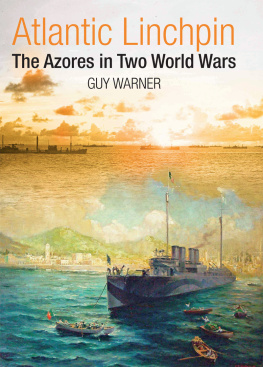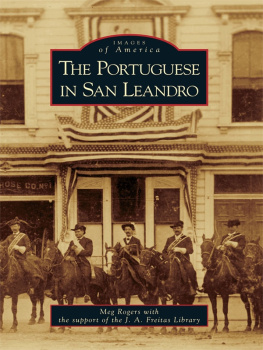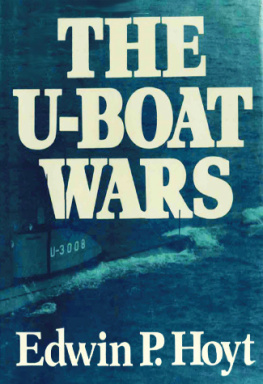
Official US Army Air Forces aeronautical chart centred on Lagens, the Azores, September 1943. (Museu de Angra do Herosmo MAH2016154
Atlantic Linchpin
The Azores in Two World Wars
GUY WARNER
Copyright Guy Warner 2021
First published in Great Britain in 2021 by
Seaforth Publishing
An imprint of Pen & Sword Books Ltd
47 Church Street, Barnsley
S Yorkshire S70 2AS
www.seaforthpublishing.com
Email
British Library Cataloguing in Publication Data
A CIP data record for this book is available from the British Library
ISBN 978-1-3990-1090-0 (Hardback)
ISBN 978-1-3990-1091-7 (ePub)
ISBN 978-3990-1092-4 (Kindle)
All rights reserved. No part of this publication may be reproduced or transmitted in any form or by any means, electronic or mechanical, including photocopying, recording, or any information storage and retrieval system, without prior permission in writing of both the copyright owner and the above publisher.
The right of Guy Warner to be identified as the author of this work has been asserted by him in accordance with the Copyright, Designs and Patents Act 1988
Pen & Sword Books Limited incorporates the imprints of Atlas, Archaeology, Aviation, Discovery, Family History, Fiction, History, Maritime, Military, Military Classics, Politics, Select, Transport, True Crime, Air World, Frontline Publishing, Leo Cooper, Remember When, Seaforth Publishing, The Praetorian Press, Wharncliffe Local History, Wharncliffe Transport, Wharncliffe True Crime and White Owl.
F OREWORD
by Capito-de-fragata Hugo Miguel Baptista Cabral, Marinha Portuguesa
In the summer of 2020 Guy Warner sent to the Portuguese Navy an email requesting more comprehensive information about the participation of Naval Aviation flying boats in the 1931 Azores Revolt. Two minutes later, Mrs Isabel Beato, the head of the Portuguese Navy Archives, knowing that I had been researching it, put me in contact with Guy by forwarding his email. This how easy two aviation history investigators more than a thousand miles apart, can come together in the twenty-first century!
A couple of emails later, Guy kindly sent me a draft of his book about the Azores at war in the twentieth century. I was amazed by the richness and thoroughness of his research, but at the same time, not surprised by his passion for the Azores, as it takes no more than a visit to these islands to fall in love with them. Nevertheless, despite the quality of his work, something was missing; actually something common to most studies about this subject, which is the Portuguese Naval Aviation role in the Azores. Yet, Guy was kind enough to change his book and include this last input.
Now the reader has the privilege of having a book that, in a very interesting and pleasant style of writing, illustrates, from each stakeholder or government viewpoint, how the strategic relevance of these islands influenced their decisions and actions. Nonetheless, the narrative of this book does not take place only in parliaments or in government offices. The author transports the reader to the places where, at a certain moment, the action is more interesting, be it in the cockpit of a Great War maritime patrol biplane or in a gun battle between a trawler and a U-boat.
For the Portuguese, since its discovery back on the fifteenth century, the Azores has constituted itself as a central point for replenishment in the Atlantic. The strategic and military importance of the Azores has always been recognised, but it registered a particular dimension in the two world wars when it became a logistically desirable region for the powerful belligerent nations. This way, from the Portuguese point of view, it was a struggle for sovereignty, trying to use the proper diplomatic tools to preserve national integrity in a fragile balance, since favouring one side could mean invasion by the other. But again, this is also another aspect well covered in Guy Warner s book.
Hugo Cabral
Setbal
November 2020
I NTRODUCTION
by Commander David Hobbs OBE, RN (retd)
Guy Warner has combined a long-standing interest in the Azores with extensive research into the operation of US and British military aircraft from the islands in two world wars and the impact that outside events had on their population. The result is a book that gives readers a fascinating insight into aspects of both wars that combine detailed accounts of how US Marine Corps aircraft were operated from 1917 onwards with descriptions of the interaction between the aviators and the local population using local newspapers as a rich source of information. The influenza pandemic in 1918 is also described, illustrating how people from very different nations and backgrounds worked together in a common cause for the general good.
Portugal had joined the Allies as a belligerent in 1916 but, despite being Great Britains oldest ally, it remained neutral in the Second World War because Britain did not appeal to it for help. Despite its neutrality, however, Portugal maintained a benevolent attitude towards the Allied cause and aircraft of RAF Coastal Command were allowed to operate from the islands. They flew long-range sorties to cover convoys in the mid-Atlantic area where air support was desperately needed and, as the number of transatlantic aircraft flights grew in both number and importance, the Azores became an important refuelling base for American aircraft in transit, a role that continued after 1945. This is also a story of ships, among them the escort carrier HMS Fencer which protected the task force that ferried the first RAF personnel to operate the airfield at Lagens from October 1943 and the former Cunard liner Franconia that carried them. The relationship between the Portuguese, British and US authorities during the conflict was not always straightforward and Guys careful descriptions show how it was made to work by the various individuals who were principally concerned.
I know of no other historian who has described the role played by the Azores in twentieth-century conflict, the significant part they played as a base for anti-submarine patrol aircraft or even their strategic importance as part of the Atlantic Air Bridge so effectively. Guy Warner is to be congratulated for bringing to life an aspect of wartime operations that has, at last, received the degree of attention it deserves.
David Hobbs
Alnwick
October 2020
A UTHOR S P REFACE
When I was at primary school in the 1960s, I often used to browse through my fathers copy of The Sheldon Book of Verse . I liked the poetry of Alfred, Lord Tennyson for its imagery and historical themes. I was particularly attracted to The Revenge A Ballad of the Fleet, which began,
At Flores in the Azores Sir Richard Grenville lay,
And a pinnace, like a fluttered bird, came flying from far away;
Spanish ships of war at sea! We have sighted fifty-three!

Sir Richard Greville and the Revenge : He had only a hundred seamen to work the ship and to fight, And he sailed away from Flores till the Spaniard came in sight, With his huge sea-castles heaving upon the weather bow. (Authors collection)














